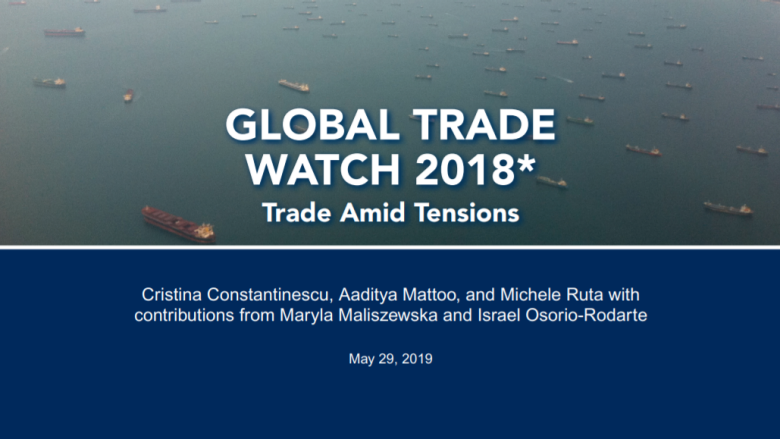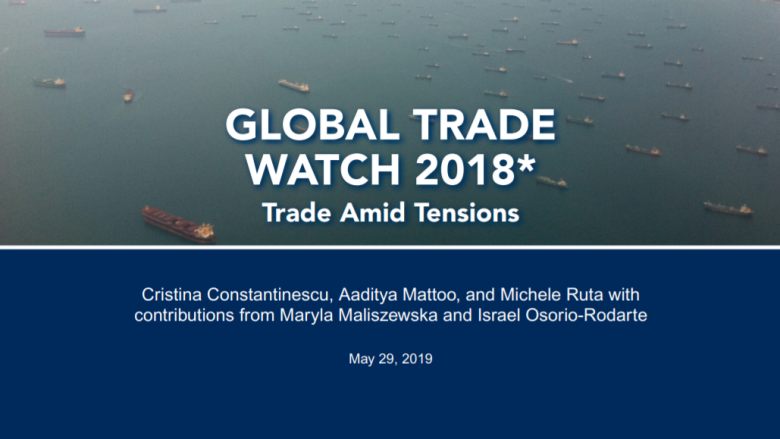## Level Up Your Understanding of Global Trade: The World Bank’s Trade Watch Series
Get ready, gamers! This isn’t your usual quest for high scores and loot. Today, we’re venturing into the complex world of global trade, where the stakes are high and the rewards… well, let’s just say they impact billions.

The World Bank’s Trade Watch Series isn’t your average dry policy document. Think of it as a cheat sheet for navigating the global marketplace, offering insights and analysis that can level up your understanding of international commerce.

The Ripple Effect

The gaming industry, like any other global sector, is intricately woven into the fabric of international trade. When trade tensions escalate, the repercussions reverberate far beyond the headlines, impacting economic growth, poverty levels, and income distribution across the globe. The World Bank’s Trade Watch series provides a crucial lens through which to understand these complex dynamics.
According to the latest Trade Watch reports, global trade growth slowed to 3.8 percent in 2018, down from 5.4 percent in 2017. This deceleration can be directly attributed to the escalating trade tensions, particularly the tit-for-tat tariffs imposed by the United States and China. While the immediate impact on global poverty has been muted, the World Bank warns that unresolved trade disputes could have devastating consequences.
In a worst-case scenario, a protracted trade war could push up to 30.7 million people into poverty, with developing countries bearing the brunt of the economic fallout. Global income could be reduced by as much as $1.4 trillion. These figures underscore the interconnectedness of the global economy and the profound impact trade tensions can have on the livelihoods of millions.
Sectoral Vulnerability
Not all sectors are equally vulnerable to trade disruptions. The Trade Watch series highlights that sectors heavily reliant on global supply chains, particularly those involving intermediate goods, are most susceptible to the negative consequences of trade wars. This vulnerability extends to the gaming industry, where the production and distribution of games often involve a complex network of international suppliers, manufacturers, and distributors.
For instance, the global semiconductor shortage, exacerbated by trade tensions, has already impacted the production of gaming hardware. Delays in the supply of crucial components, such as microprocessors and graphics cards, can lead to production bottlenecks, increased costs, and ultimately, higher prices for gamers.
Hot Spots and Cold Spots
Identifying Vulnerability
Understanding the specific sectors and regions most vulnerable to trade disruptions is crucial for mitigating the potential impact on the gaming industry. The World Bank’s Trade Watch series provides valuable insights into these “hot spots” and “cold spots” by analyzing real-time shipping data, trade statistics, and other indicators.
For example, the Trade Watch reports indicate that the manufacturing sector in developing countries, including several key players in the global gaming supply chain, is particularly vulnerable to trade tensions. These countries often rely heavily on exports to developed markets, making them susceptible to shifts in global demand and disruptions in trade flows.
Job Losses and Supply Chain Bottlenecks
The implementation of retaliatory tariffs can have a ripple effect across entire supply chains, leading to job losses, production delays, and ultimately, reduced access to gaming products for consumers. The Trade Watch series highlights the potential for job losses in sectors such as manufacturing, logistics, and retail, particularly in countries heavily reliant on exports to the United States and China.
Furthermore, disruptions in global supply chains can result in delays in the delivery of gaming consoles, games, and accessories, impacting both consumers and game developers. Production bottlenecks and increased transportation costs can also lead to price increases, making gaming products less affordable for consumers.
Investment Shifts
The uncertainty created by trade tensions can discourage foreign investment, hindering economic growth and innovation in the gaming industry. As companies grapple with fluctuating trade policies and potential disruptions, they may be less likely to invest in new technologies, expand their operations, or develop new gaming titles.
This lack of investment can stifle the growth of the gaming sector, limiting its potential to create jobs, generate revenue, and contribute to economic development.
Gamestanza’s Take-Away
Practical Implications for Gamers and Gaming Companies
The escalating trade tensions have profound implications for the gaming industry, affecting gamers, game developers, publishers, and distributors alike. Gamestanza urges its readers to stay informed about the latest developments and consider the following practical steps:
- Monitor Trade Policy Changes: Stay up-to-date on trade agreements, tariffs, and other policies that could impact the availability and affordability of gaming products.
- Diversify Supply Chains: Explore alternative sourcing options and reduce reliance on single suppliers to mitigate the risk of disruptions.
- Support Fair Trade Practices: Advocate for policies that promote fair trade, ethical sourcing, and worker rights within the gaming industry.
- Engage with Policymakers: Make your voice heard by contacting your elected officials and urging them to support policies that foster a stable and inclusive global gaming ecosystem.
Multilateral Solutions
The Role of the World Trade Organization
The World Trade Organization (WTO) plays a crucial role in regulating international trade and resolving trade disputes. The Trade Watch series emphasizes the importance of multilateral solutions in addressing trade tensions and fostering a stable global trading environment.
Strengthening the WTO, reforming its dispute settlement mechanism, and promoting transparency and accountability are essential steps toward mitigating the risks of trade wars and ensuring a level playing field for all countries, including those in the gaming industry.
The Power of Policy
Government Action for Stability
National governments have a crucial role to play in mitigating the negative consequences of trade tensions and promoting a favorable environment for the gaming industry. The Trade Watch series highlights the effectiveness of government policies in promoting fair trade practices, supporting domestic industries, and fostering economic stability.
Effective policies can include:
- Investment in Research and Development: Supporting innovation and technological advancements in the gaming sector.
- Training and Education: Developing a skilled workforce capable of meeting the demands of a rapidly evolving gaming industry.
- Tax Incentives and Subsidies: Encouraging investment in gaming development and production.
- Trade Agreements: Negotiating bilateral and multilateral trade agreements that reduce barriers to trade and promote market access for gaming products.
Gamestanza’s Role
Engaging in Constructive Dialogue
As a leading platform for gaming news, insights, and analysis, Gamestanza recognizes the importance of engaging in constructive dialogue and advocating for policies that promote a thriving and inclusive global gaming ecosystem.
We encourage our readers to:
- Stay Informed: Continuously educate yourself about the latest developments in international trade and their potential impact on the gaming industry.
- Engage with Policymakers: Contact your elected officials and express your views on trade policies that affect the gaming sector.
- Support Fair Trade Practices: Advocate for policies that promote ethical sourcing, worker rights, and sustainable development within the gaming industry.
- Join the Conversation: Participate in online forums, discussions, and events to share your perspectives and contribute to a broader understanding of the complex interplay between trade and gaming.
By working together, gamers, game developers, policymakers, and organizations like Gamestanza can create a more equitable and sustainable future for the global gaming industry.
Conclusion
Conclusion: Navigating the Trade Watch Series – World Bank
In our comprehensive analysis of the World Bank’s Trade Watch Series, we have delved into the intricacies of global trade policies and their impact on economies around the world. We began by highlighting the significance of trade as a driving force behind economic growth, and how the World Bank’s Trade Watch Series provides a crucial framework for understanding the complex dynamics at play. Our discussion covered the key themes of trade facilitation, regional integration, and the role of digital trade in shaping the future of global commerce. We also examined the challenges posed by protectionism, the importance of trade agreements, and the impact of the COVID-19 pandemic on global trade.
As we reflect on the key points and main arguments discussed in this article, it becomes clear that the World Bank’s Trade Watch Series offers a vital tool for navigating the complexities of global trade. The significance of this topic extends far beyond the realm of economics, as trade has a profound impact on the lives of individuals, communities, and nations. The implications of our analysis are far-reaching, with the potential to inform policy decisions, shape business strategies, and drive economic growth. As we look to the future, it is clear that the World Bank’s Trade Watch Series will continue to play a critical role in shaping the global trade landscape.
As we conclude our exploration of the World Bank’s Trade Watch Series, one thing is clear: the future of global trade hangs in the balance. Will nations prioritize cooperation and collaboration, or will protectionism and isolationism prevail? The choice is ours, and the consequences will be far-reaching. As we move forward, let us remember that trade is not just an economic concept, but a powerful force for shaping the world we live in. Will we harness its potential to drive growth, prosperity, and progress, or will we succumb to the dangers of protectionism and division? The answer lies in our collective willingness to engage, adapt, and evolve in the face of an ever-changing trade landscape.